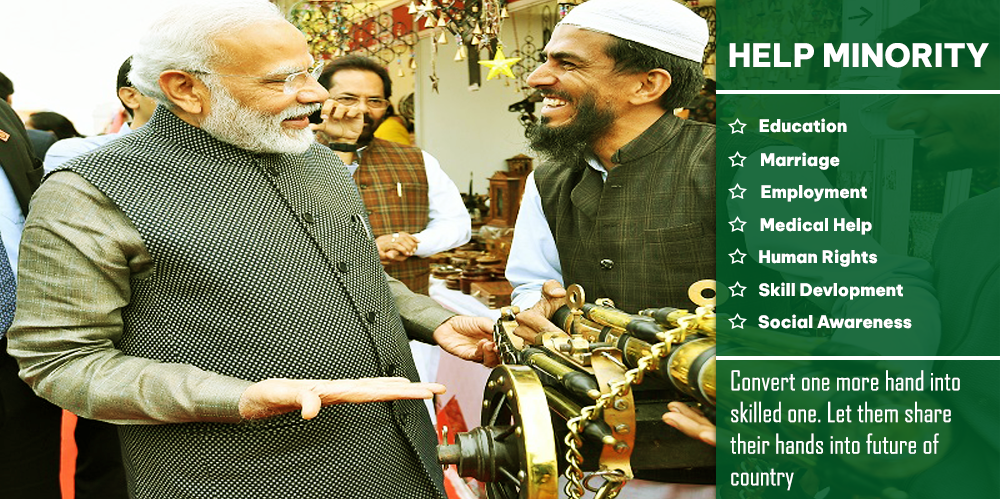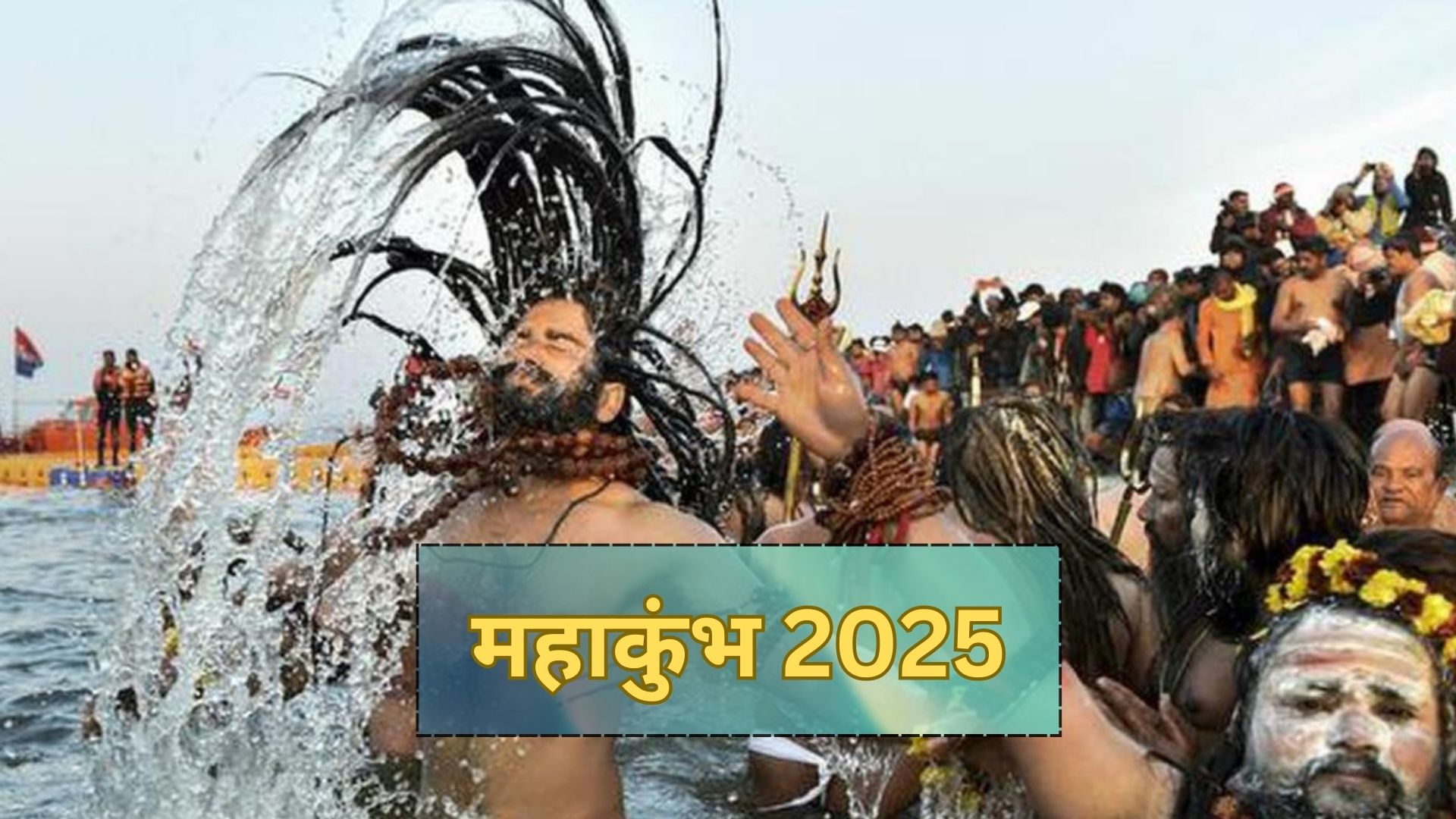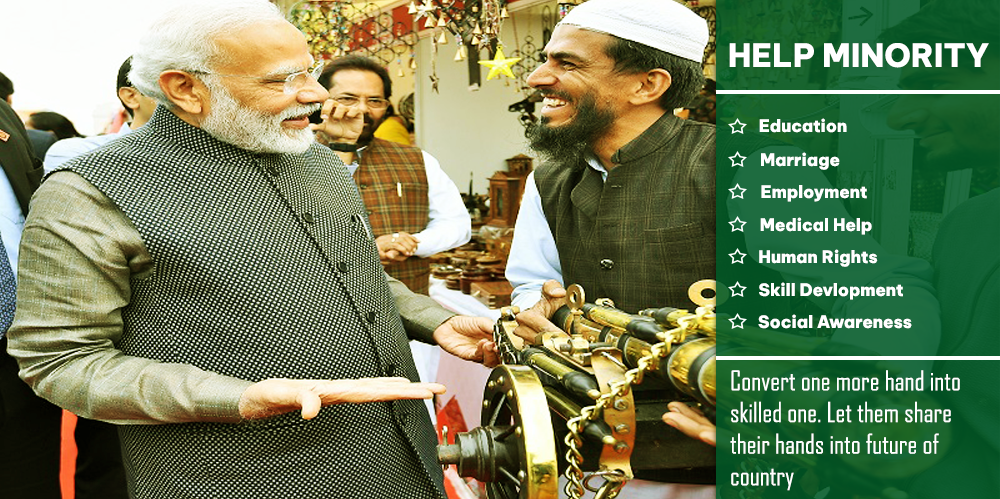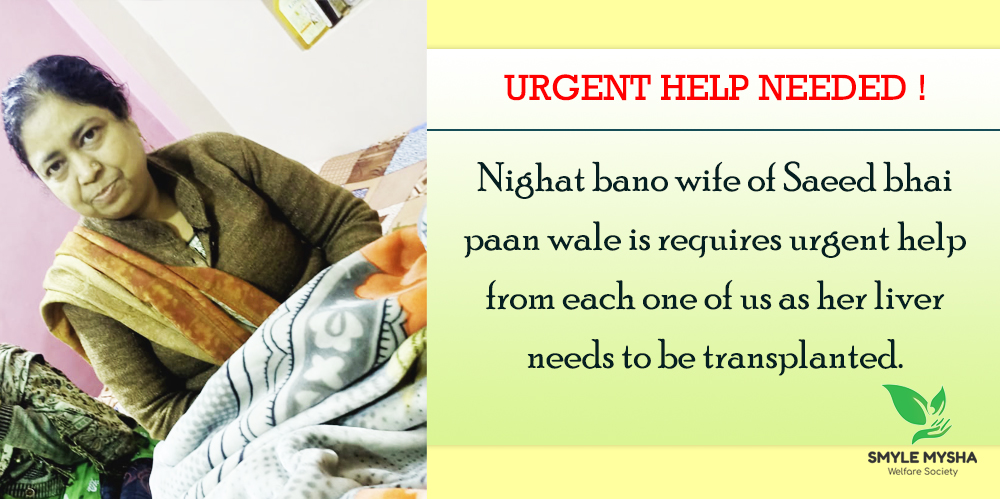Help Minority | Education | Marriage | Health

About The Fundraiser
“Who is a Minority in India?” — A Chronology
26.01.1950 The Constitution of India came into effect, with special fundamental rights for minorities:
Article 29 — Protection of interests of minorities
(1) Any section of the citizens residing in the territory of India or any part thereof having a distinct language, script, or culture of its own shall have the right to conserve the same.
(2) No citizen shall be denied admission into any educational institution maintained by the State or receiving aid out of State funds on grounds only of religion, race, caste, language, or any of them.
Article 30– Right of minorities to establish and administer educational institutions
(1) All minorities, whether based on religion or language, shall have the right to establish and administer educational institutions of their choice.
(2) The State shall not, in granting aid to educational institutions, discriminate against any educational institution on the ground that it is under the management of a minority, whether based on religion or language.
22.05.1958 In Re: The Kerala Education Bill, 1957. Reference Under Article 143(1) of The Constitution of India, the Supreme Court considered the following question among others: “Do any provisions of the Kerala Education Bill offend Article 30(1) of the Constitution?” In the course of answering this, the Apex Court discussed, “What is a minority? That is a term that is not defined in the Constitution. It is easy to say that a minority community means a community that is numerically less than 50 percent, but then the question is not fully answered, for part of the question has yet to be answered, namely, 50 percent of what? Is it 50 percent of the entire population of India or 50 percent of the population of a State forming a part of the Union?”
The Supreme Court observed that the question of whether the bill offended Art 30(1) itself proceeds on the footing that there are minorities in Kerala who are entitled to the rights conferred by Art. 30 (1). The Court further said, “strictly speaking, for answering the question we need not enquire as to what a minority community means or how it is to be ascertained.”
05.05.1971 In D.A.V. College Etc vs State of Punjab & Ors it was held that “Religious or linguistic minorities are to be determined only about the particular legislation which is sought to be impugned; if it is State Legislature these minorities have to be determined about the population of the State.”
12.01.1978 The setting up of the Minorities Commission was envisaged in the Ministry of Home Affairs Resolution which specifically mentioned that “despite the safeguards provided in the Constitution and the laws in force, there persists among the Minorities a feeling of inequality and discrimination. To preserve secular traditions and to promote National Integration the Government of India attaches the highest importance to the enforcement of the safeguards provided for the Minorities and is of the firm view that effective institutional arrangements are urgently required for the enforcement and implementation of all the safeguards provided for the Minorities in the Constitution, in the Central and State Laws and in the government policies and administrative schemes enunciated from time to time.”
1984 The Minorities Commission was detached from the Ministry of Home Affairs and placed under the newly created Ministry of Welfare.
30.03.1988 Ministry of Welfare, Government of India, vide resolution No. IV 12011/2/88 CLM amended clauses 2 & 3 of the original Home Ministry Resolution of January 1978 thereby removing the Minority Commission’s jurisdiction over linguistic minorities of the country.
17.05.1992 The National Commission for Minorities Act, 1992 was enacted. 2(c) of the Act defines “minority”, for this Act, means a community notified as such by the Central Government. Thus, only the Central Government can notify a community as a “minority” under the Act.
18.12.1992 Declaration on the Rights of Persons Belonging to National or Ethnic, Religious and Linguistic Minorities adopted by the UN General Assembly vide resolution No. 47/135, begins with the article: “States shall protect the existence and the national or ethnic, cultural, religious and linguistic identity of minorities within their respective territories and shall encourage conditions for the promotion of that identity.”
17.05.1993 The first statutory National Commission for Minorities (NCM) was set up.
23.10.1993 Vide a Gazette notification issued by the Ministry of Welfare, Government of India, five religious communities viz; the Muslims, Christians, Sikhs, Buddhists, and Zoroastrians (Parsis) were notified as minority communities.
31.10.2002 In T.M.A. Pai Foundation & Ors vs State of Karnataka & Ors the Supreme answered the question “What is the meaning and content of the expression minorities in Article 30 of the Constitution of India?” as follows:
“Linguistic and religious minorities are covered by the expression “minority” under Article 30 of the Constitution. Since the reorganization of the States in India has been on linguistic lines, therefore, to determine the minority, the unit will be the State and not the whole of India. Thus, religious and linguistic minorities, who have been put at par in Article 30, have to be considered state-wise.”
11.11.2004 The National Commission for Minority Educational Institutions (NCMEI) Act came into force.
2(da) “educational rights to minorities” means the rights of minorities to establish and administer educational institutions of their choice;
2(f) “minority”, for this Act, means a community notified as such by the Central Government;
2(g) “Minority Educational Institution” means a college or an educational institution established and administered by a minority or minorities.
23.12.2004 The Constitution (103rd Amendment) Bill, 2004, and the NCM (Repeal) Bill, 2004 were introduced in Lok Sabha. The Bills were referred to the Department-related Parliamentary Standing Committee on Social Justice and Empowerment which submitted its report on February 21, 2006. The Amendment Bill proposed to establish a new National Commission for Minorities, with constitutional status.
This bill was reportedly allowed to lapse because if the government attempted to push through the Bill, it would have had to redefine minorities, a proposal that was strongly opposed by Muslims, Christians, Sikhs, and other minorities alike. Leaders of the minority communities and experts who opposed the move argued that a state-specific definition of minorities would result in distortions in minority rights. Christians in many Northeastern states and Sikhs in Punjab would have been declared majority groups and consequently deprived of constitutionally-sanctioned minority rights. It would have resulted in many other anomalies like Christian students becoming ineligible for admission to minority educational institutions in other states as they would not have a domicile minority status there. Given all these problems, Minister A.R. Antulay reportedly assured that there would be no change in the definition of religious minorities.
08.08.2005 In Bal Patil & Anr vs Union of India & Ors, the Jain community sought the issuance of a mandamus/direction to the Central Government to notify ‘Jains’ as a ‘minority’ community under section 2(c) of the National Commission for Minorities Act, 1992. In that judgment, the Supreme Court observed thus:
“The eleven-judge Bench in TMA Pai Foundation Case had held that claims of minorities on both linguistic and religious basis would be each State as a unit. The country has already been reorganized in the year 1956 under the States Reorganization Act on the basis of language. Differential treatment of linguistic minorities based on language within the state is understandable. But if the same concept for minorities on the basis of religion is encouraged, the whole country, which is already underclass and has social conflicts due to various divisive forces, will further face division on the basis of religious diversities. Such claims to minority status based on religion would increase the fond hope of various sections of people getting special protections, privileges, and treatment as part of a constitutional guarantee. Encouragement to such fissiparous tendencies would be a serious jolt to the secular structure of constitutional democracy.”
The Supreme Court rejected the Jain community’s prayer to “Direct the Central government to notify Jains as a religious minority by way of issuing a notification to this effect under Sec 2(c) of the NCM Act.”
27.01.2014 Jains were notified as a minority community by the Central Government.
10.11.2017 Advocate Ashwini Kumar Upadhyay had filed WP(C) 1064/2017 to declare the Notification dated 23.10.1993, arbitrary unreasonable and ultra-vires the Constitution but withdrew it with liberty to approach the National Commission for Minorities (NCM) and accordingly, submitted a representation on 17.11.2017. The NCM reportedly did not respond to his representation for 15 months.
11.02.2019 The writ petition WP(C) 94/2019 filed by Advocate Ashwini Upadhyay before the Supreme Court was disposed of. The Supreme Court was of the view that “the NCM should consider the representation dated 17th November 2017 filed by the petitioner and pass appropriate orders thereon within a period of three months. Once the said exercise is completed, the petitioner will be free to avail of such remedies as available to him in law.” The petitioner had reportedly filed the writ petition with the following prayers:
a) direct and declare that Section 2(c) of the NCM Act 1992 is void and inoperative for being arbitrary, unreasonable, and offending Articles 14, 15, and 21 of the Constitution of India;
b) direct and declare that the Notification on Minority Community dated 23.10.1993 [1993 –SO No.816(E) F.No.1/11/93-MC(D)] is void and inoperative for being arbitrarily unreasonable and offending Articles 14, 15, 21, 29 and 30 of the Constitution of India;
c) direct the Government to define “Minorities” and lay down guidelines for their identification, to ensure that only those religious and linguistic groups, which are socially economically, and politically non-dominant and numerically inferior, may enjoy rights and protections guaranteed under Articles 29-30, with the State being the unit of determination;
d) in the alternative to prayer (c), direct and declare that only those religious and linguistic groups of Indian citizens, which are socially economically, and politically non-dominant and numerically not more than 1% of the total population of that respective State, may enjoy rights and protections guaranteed under Articles 29-30 of the Constitution.
These above statements are legit and provided by some legit sources and on behalf of this, we know the real meaning of Minority in India.
In this great country, our government has made every effort to assist minority groups as much as possible, but it is not easy to obtain a solution solely through the government.
We must all come forward and start supporting minorities from our own side by contributing to this cause and lending a helping hand to the current government.
Minorities are always first in line for assistance, regardless of the wait from the government or the people of India. In the current situation, where our respected government is trying to change the odds of success, it is too hard for them to give all their efforts to minority groups in India. We need to step forward to start supporting these minority groups by contributing donations. These contributions will be applied to their global like:
Education issues of the minority, mostly Muslims
Minority groups are yet to find a solution to get rid of these labels from their foreheads but still have not received the proper solution. Let us see what the issues they are facing are from the education side. Every minority group has difficulties and faces educational issues, but Muslims are the ones who have the biggest number of illiteracy.
The Muslim population in India is large in comparison to other countries, and the problem is their illiteracy and lack of educational awareness.
This is not to say that our current government is uninterested in addressing their educational issues; however, the main concern is the program and the lack of funds to provide a better solution to these communities.
As a result, this cause is solely focused on educating minority groups and providing them with support through education and awareness.
The funds contributed will be used to educate them, raise their awareness through Nukkad Natak, and make them aware of our government's programs, among other things.
Group marriage support
Minorities, particularly Muslim families, always have a problem with the number of children.
The program will take into account all minorities, but Muslims will be prioritized because they must be educated on population control. Instead of having more than two children, they can have two and provide them with the education they need to live respectfully.
This cause will organize a group marriage program for minority groups, followed by knowledge and awareness about population control. The fund will be used to organize group marriages of these community members on a yearly basis.
Employment
Employment is currently the most pressing issue in India.
According to the population control system, this is increasing every year, and in a short time there will be a blast, and once that happens, there will be no going back. So, as our previous step was to raise population control awareness in these communities, we must also provide them with employment to improve their living conditions so they can educate their children, and only basic or higher education is the solution to teach them what is right and wrong. This program will train members of the community in areas such as computer skills, handicrafts, enrolling in human resources, baking, medical staff, weaving, and carpentry.
Human rights
Human rights are extremely important to any community on the planet. Everyone should be aware of the rights stated by the government in our legal constitution. Illiteracy is the leading cause of crime, illegal activity, and antisocial behavior. As previously stated, our primary goal would be to provide educational assistance and ensure that these minority communities receive at least a basic education, which would provide a cure for it.
Show on the road
Natak Nukkad
Electronic media
Door-to-door sales
Monthly summer camp
These steps will raise their awareness of their human rights, as well as what they have and what they should not do in violation of the law.
Skill development
As we mentioned above, skill development will improve their ability to earn enough to educate their children. Let us give what skill development we can provide to someone who has never had proper work as per their qualification or who has never been skilled in their work.
Medical help
People in minority groups will get medical help from this program. They can submit a request to us. We will try our best to provide the best solution for their critical medical conditions. The fund will be used for this cause, among other causes.
Social Awareness
It is obvious that a person with no education has low knowledge of social activities. Some participate, but only if someone explains to them what they must do. Through camp, digital media, and common resources, we will try to teach them social awareness.
Finally, our NGO's campaign only assists minority groups, with a particular emphasis on Muslims, who constitute a sizable population in the country and face significant illiteracy challenges. The donated funds will be used to redesign their lives, which will be extremely beneficial to their future success.
These minority groups and individuals are encouraged to register on our website. They must donate at least 100 RS at the time of registration and provide full details about their family and the profession they use for a living. Only those who register for this program will be eligible for its benefits. Only those who have registered here can request assistance from this program, which ranges from education scholarships to medical assistance.
Latest Update
Comments

Smyle Mysha
allahabad Campaigner
Top Donor

Mazher
₹ 1,001.00
Most Generous
Urgent Fundraisers
View urgent fundraisers that are most active right now.


